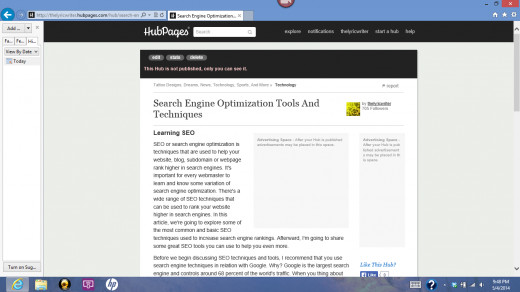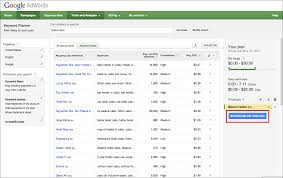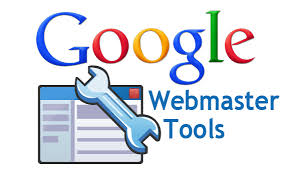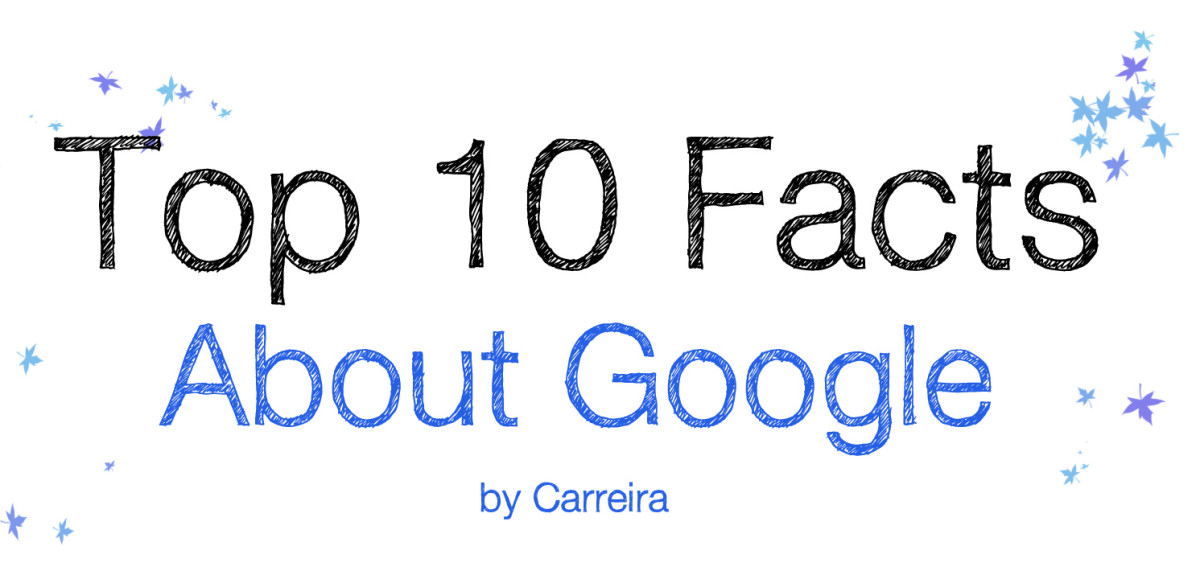- HubPages»
- Technology»
- Internet & the Web»
- Search Engines
Search Engine Optimization Tools And Techniques

Learning SEO
SEO or search engine optimization is techniques that are used to help your website, blog, subdomain or webpage rank higher in search engines. It's important for every webmaster to learn and know some variation of search engine optimization. There's a wide range of SEO techniques that can be used to rank your website higher in search engines. In this article, we're going to explore some of the most common and basic SEO techniques used to increase search engine rankings. Afterward, I'm going to share some great SEO tools you can use to help you even more.
Before we begin discussing SEO techniques and tools, I recommend that you use search engine techniques in relation with Google. Why? Google is the largest search engine and controls around 68 percent of the world's traffic. When you thing about search engines, you probably think about Google, Yahoo and Bing. Both Yahoo and Bing control less then 13 percent. If you go by Google policy and guidelines, your website will rank in Yahoo and Bing anyway. Google has made it very clear as to what they expect and what they look for in a website, take the time to research this information from a trusted source.
There's a lot to take in from this article. Be sure to bookmark it or give it a favorite to keep it close. If you have any questions, I'll help you as much as you can. Learning search engine optimization is an on-going process, we're always learning and evaluating. Analytics and data are crucial to mastering SEO. Due to this, you need to make sure you have the right tools and software. Don't worry, we'll discuss this later. Here we go!

Basic Search Engine Optimization
It doesn't matter if you know search engine optimization or you've never heard of the term before, I'm going to teach you basic search engine optimization techniques that you can use to get better all around results for your website. This is why we use SEO anyway, right? When you use SEO correctly, you'll see an increase in traffic and keyword rankings. Now, if you're selling products or advertising, more traffic is going to increase your profits. More traffic equals more revenue in most cases.
Now, some of the basic search engine optimization techniques we're going to talk about is titles, sub-titles, keywords, researching keywords, researching topics, link building, metadata, descriptions and content. Each one of these terms plays a role in search engine optimization. You can use the SEO techniques below to begin building your ranks in Google's search engines. Let's begin.

Title And Sub-Titles
Titles are extremely important when it comes to search engine optimization. This is what tells the search engine what your webpage is about. For example, the title of this article is Search Engine Optimization Techniques And Tools. As you can see, the title is exactly what this article is about. Nearly all content management systems require you to have a title before an article is published. Yes, but your title plays an important role. If you go to the Google search engine and you search for a particular word, you'll notice that Google responds by placing relative content. You'll see that the titles are highlighted in blue. This is the title of that page. When this article is indexed and ranked by Google, the title will appear just as it is written above. You want to always make sure that your title is relative to the content you write.
Sub-titles are also important for SEO and user experience. Just to clear the wind, some of you may refer to a title with the term heading and sub-title as sub-heading. In this case, it means the same. If you see the sub-title to this specific section of my article, you see that it reads Titles And Sub-Titles. This phrase is my sub-title for this particular section. Both titles and sub-titles can be found by search engines. It ads relevance to the search engines. It lets the search engine bot know that this title is in relation to the main title. Now, if you're not using sub-titles, the search engine won't find them. Using them within your content gives you a better chance to rank in search engines.

Keywords And Keyword Phrases
Using the correct keywords and keyword phrases is another critical aspect of search engine optimization. What is a keyword? Remember when you went to Google and searched for something? Remember the term or words you searched for? This is a keyword. Any word or group of words can be a keyword depending on what you're writing in your content. This is exactly how you get your content and website found within the search engines. In this article, you can see that we have several different keywords. They include SEO, search engines and search engine optimization to name a few. All of these keywords are relative to this specific article. These exact keywords are searched for via Google thousands of times a month. Nearly every single word is searched for through Google. Since I know this, I know that my article has a high rate of getting some of that traffic because I used the keywords.
Your keyword choices are going to depend what your website and content is about. If you have a blog or write about multiple topics, your keywords will likely vary. This actually is an advantage because it gives you more traffic and keywords to work with. If you writing about a specific niche or subject, your keywords can be limited. Finding and using the correct keywords is going to be important as we're about to discuss.
Another important element to remember as you try to rank for keywords is competition keywords. These are keywords that you want to rank for that another currently ranks with. Both of you are trying to rank for the same keyword. There's 3 classifications to these types of keywords, low competition keywords, medium competition keywords and high competition keywords. High competition keywords mean that the keyword is used by a lot of different domains. These keywords are hard to rank for and take time, often years. Low competition keywords are used less, these are usually the ideal keywords to rank for. However, if you want massive traffic, you have to start ranking for those though keywords.
Your keyword list is going to be extremely important. This is going to be one of the many blueprints for your website. If you target keywords that don't have search volumes, you can expect to see big traffic from ranking for them. In my opinion, if it is only getting 10 searches a month, I don't want to waste my time trying to rank for it and neither should you. If it is a specific keyword that describes your product or service, then you may want to consider it. If it doesn't, it may not be worth the investment.

Google Keyword Planner
In order to find the correct keywords and phrases that you want to use, you're going to need a tool that is capable of telling you how many times a word is searched. I highly recommend using Google Keyword Planner. For one, it displays information from Google's search engine, not Bing and Yahoo. That's ok though, remember, Google us the search engine leader by far. Once you start working on rankings with Google, Yahoo and Bing rankings will likely follow.
Now, you need to find how much traffic is coming in for your keywords. You can also get Keyword ideas, just in case you can't think of anymore or you don't know what keywords to base your content on. My suggestion, if you're writing for performance, you want to target high traffic keywords. Now, if you are writing about specific products to sell, you will have less keywords to work with. You'll have to determine which keywords and key phrases will work best for your situation.

Grow Your Website With Content
If you know a little about search engine optimization or you've been researching SEO, you've probably heard the phrase, "Content Is King." What does this refer to? As you're learning, SEO has many variations and techniques. Creating good high quality content is a very important aspect of SEO. It ranks right up there with link building. When you consider the best SEO techniques to use to rank keywords, content is going to be your winner. Writing and publishing content on your website will help you grow rankings, traffic, leads and profits is you're going that course.
Here's my personal and professional opinion of creating content for search engine optimization purposes. For one, if you publish content on a regular basis, you will see your rankings increase. Google likes fresh content and you want to give your readers options, very important when you're first starting a website. Two, this is how you grow organic keyword rankings. You have to rank organically if you want massive traffic. Don't pay for paid traffic. If your main goal is to sell something, work your content around those items. When you have established content, you can think about paid search, SEM or PPC. You have to make sure you have established content first.
I get a lot of questions asking, "How long should my content be for SEO?" I've been doing SEO for 7 years now, writing since I was 15. Based on my experience, Google ranks articles on the first page that are 400 words and 3,000 words. The important thing to remember is making your content useful. If your content is not useful, who will read it? Poetry is not going to rank. Sorry. Stories about your dog are not going to rank. Eventually, they could. You may even go viral, but it's not likely. At the least, you should be aiming at 500 words.
My suggestion, I want my content to be at least 1,000 words or more. In my experience, articles that are longer do rank better and higher. It all depends on the keywords that the article ranks for. Especially if your website is new, aim for long informative articles with graphics/images. There has always been a debate about content length, you'll here a lot about both sides. If you're learning SEO to provide SEO services, I suggest that you do your own case studies to learn. No one knows the exact answer to this question, I wish I did, but I don't. In my experience though, longer content ranks better.
I know most of you want to rank as quick as possible. The more content you publish, the more indexed pages you will have in Google and other search engines. More indexes often equal more traffic. Don't get lazy with your content though. Remember, quality content ranks great, a few hundred words about anything doesn't. Be specific in your content, use your titles, headings and keywords. Monitor your content and see which articles get the most traffic. Case studies and examples are a big help. If something is working, go with the flow.

Link Building
Claimed to be the most important SEO technique to publishing content is link building. Just like SEO in itself, there's a number of link building techniques that can be used to increase your search engine rankings. First, I want to discuss internal link building. Internal refers to on page, your website. If you go to a website and you see the blue lettering with an underline, this is a link. Now, we all know that a link transfers us from one page to another. If you didn't know, you know now. Now, that link can be pointed to anywhere on the web. If a link is pointed to another webpage on your own website, this is known as an internal link. If you have a link on your website and it's pointed to another website, this is known as an external link or backlink.
When it comes to link building, we can go on for days discussing everything. In simple terms, there's a lot to link building and link metrics. Link building is often known as a black hat SEO technique. By definition, this is a technique that is often frowned upon by Google. White hat SEO techniques are SEO techniques that are in accordance with Google's rules. There's nothing wrong with building internal links through your website. The goal of the links is to provide your users an easy pathway to relative content. Relative is a big work in today's link building. We'll talk about this more later, this is only a crash course on links. Trust me, you have a lot more to learn if you want to be successful at it.
According to Google, you shouldn't go to other websites to build links. This is often took out of context. Link building is a very important technique in SEO. Google feels that a website's backlinks defines it popularity. This is true, more popular websites have a ton of backlinks, many with millions. This is another reason that you need to build high quality content. Your hope should be that another website will find your content and link to it. If you're writing content that is informative, websites will. The bad thing, it can take a year or longer if you're a new website. Link building is extremely important to new websites.
Each link that is created has value, no two are alike. Some links are more valuable then others. At Hale Associations, we use SEO software to determine the value of a link. Websites that have a high PR (page rank) have higher valued links then a website that has no page rank. If you're link building, you will need to target websites that have high link values. Easier said then done but that's the technique in a shell. Many people don't realize that each link has a particular value, but it does. That value will reflect on your rankings.
At the very least, if you plan to do SEO, you should invest in SEO software or link building software. Perhaps not to build links but at the least, to measure your link metrics. I'm not telling you to go out and build links, that is a risk you take with Google. Established websites can build links much easier then new websites. Your at a huge disadvantage with new websites and this is why most people choose to build their links manually. I wouldn't suggest automated link building software but some SEOs live by it and live well. Your dancing with Google on that one my friend. Ultimately, it's a risk that you will have to consider at some point and time.
Now, after all the years I've spent doing SEO, I've learned a lot. If you build high quality content that is useful, others will link to it naturally. This is another reason that you want to build content and a lot of it. When webmasters, writers or bloggers build massive content, they tend to get sloppy, not case as much from one article to the next. You can't expect others to link build to you content if it's not worth reading. Make your content worth the value of a link, make your content unique. Don't be afraid to run test and try something new. Some people love stirring the pot up per say, writing about topics that are controversial. Content such as this often attracts high quality links.
I know this is a lot to take in, especially with the whole article. I recommend that you take the time and learn link building. Remember, all links have values. You should strive for high quality links with a high value. Yes, every link has weight but one high quality link can help you more then hundreds of links with little value. Producing content and links on a regular basis will rank you faster then any other combination of SEO techniques. This is very true for new websites trying to get off the ground.

Social Media Marketing
Social media marketing or often known as SMM, is a technique of SEO in some sense that is used to increase your SEO rankings, build links and help promote your business or website. You get SEO and marketing benefits from social media marketing. Social metrics hasn't always been part of the SEO equation. A few years ago, they had no effect on how you rank in search engines. Today, they do count but less then 10 percent some experts suggest.
There's a lot of benefits from social media marketing. The same reason I chose to include it in this article. SMM is a great way to build links by sharing your website content, blog content, videos, podcast, anything your creating a link to. Just like every other type of software on the market, there is software out there that does your social media work for you, known as social media submission software. It can be a very effective tool to use, especially if you have a lot of social media websites and content to share.
Facebook, Twitter, Pinterest, YouTube, Google+, Instagram, Reddit and Stumble Upon are just a few of the thousands of social platforms online. Some are popular then others but most of them have massive traffic and users. Some people have the time to post to all their social channels, you may not. You may have to choose only a handful to post to. You need to see which social media websites will benefit you the most and go for it.
Social media platforms are an excellent way to reach out to fans and customers. Everyone is using social platforms, at least one. Just like you build your website, you'll need to build your social channels the same. Many people fail to realize that your social websites are just like a domain, they have an authority. Increase this authority and you'll get better value for your content, promotions and links. In a few years, you'll be glad you did.

SEO Tools
I know this is a decent sized article and truth be told, I barely scratched the surface of SEO. This will get you started though. As I said before, you need to know some SEO and how it affects your website. All webmasters need to know search engine optimization. Take the time to learn it, study it, run case studies and track your progress. Analysis is a powerful tool and as you'll learn now, you're going to need it for SEO.
We already discussed Google's Keyword Planner. It's a SEO tool you have to have. Don't worry about Yahoo and Bing. At this current time, Google is still the king of the hill. This will likely change one day but not now. When you begin ranking for Google, you'll also rank for Yahoo and Bing. Google is the leader and everyone else follows.
I know how hard it can be when you first start out. You may be writing to make money. You may be inspiring to be a SEO and don't have a budget yet. I've been there. I started working online to make money. Just like the old saying, it takes money to make money. Due to this, there's two free tools that you can't go without. They are Google Analytics and Google Webmaster Tools. These two tools are free and great to use. I've been doing SEO going on 8 years and I still use them today with my other SEO software.
Now, if you're doing search engine optimization, you can't do it in the dark. You have to track your stats. If you don't, I won't say you fail but you'll be at a major disadvantage. You should be tracking all your data. Keyword rankings, page rankings, sitemaps, traffic, user behavior, the whole nine yards, Google Analytics is great for user behavior and traffic flows. Google Webmaster is good for search queries and both has many more features. Be sure you get them both. Again, both of them are free to use and perfect tools to start with.

Web Design
Some may not know that the design of your website plays a vital role in your SEO rankings but it does. The design of your website can affect your website's SEO value. This relates back to titles, headings, sub-titles and sub-headings. Make sure they are plentiful but accurate to the content. Speaking of content, the way your content is displayed is also important. Have you heard the term "above the fold?" When you visit a web page, without scrolling down, the top area above the bottom screen is the most valued area of that webpage. The most important content should be placed here.
Your home page is always the most valued page of your website. Every page on your website has a value. Page rank, page authority and domain authority are all important elements to remember. If your website has a page rank, it doesn't mean that your entire website and all the pages within has a page rank. Distributing your page rank to benefit your other pages is important, falls into the category of on-site link building. Link building within your website is important for SEO and user experience. Again, be sure that your links are relative. Don't link a page on gardening to another page in your website about wrestling. You always want to make sure that your links are relative and not misleading.
Your site title, page titles, page sub-titles and any type of header can appear in search results. I know some people don't like using them within their website due to the look but they are important.

Images
Images are another important aspect of SEO. Pictures can be found through a website. They may be published on the website or in a blog post. Some of you may use widgets to post pictures in the sidebars, headers or footers. Just like your content, images can be indexed and rank in search engines. In order for them to rank, we need the search bot to know what the picture is. Now, the search bot can read millions of words in no time. When it comes to pictures, the search bot can't see images. Due to this, you need to make sure your pictures have text known as alternate text. You may see it displayed as alt txt or alt text. Very important. You should accurately describe the content in this section. I would advise that you use a long tailed keyword, not a full sentence.
Yes, images are important for SEO but they play a much bigger role with interaction and user experience. Pictures tell a story on their own and it is known that content with pictures perform better. Make sure you have a good mix of both. This same concept should also be used on your social media platforms as well. A good mix of content, images, graphics, videos, media, charts, polls and any other type of element that you can use gives your visitors options. Remember, the idea is to keep your visitors interested and on your website, you don't want them leaving. As you build your website, you want to offer your users other options through other content sources.

Conclusion
This is just the beginning of SEO, there's a lot more to learn about search engine optimization. These are all the basics. Remember though, these are basic SEO techniques but all of them are important. SEO is always evolving and changing. Search engines are always changing. What works today may not work tomorrow. If you're looking to get into search engine optimization, you should take the time to learn Google policy and search engine guidelines. Always be a student of the game.
I always wanted to be the best SEO in the world. I've spent countless hours learning, studying and getting better. I'm still learning nearly 8 years later. SEO is not defined, none of us know exactly how to get to the top of Google. We have countless case studies and analysis to fall back on but nobody knows the total equation. In a sense, this gives new SEOs an advantage. I hope this article helps you get started in SEO and although it's not everything, it's a great guide to help you get started.
It's important to note that SEO is not a short-term solution to your rankings and traffic. Many SEO techniques take weeks and months to fully see benefits from the actions taken. SEO should always be viewed as a long-term solution. It takes time to develop rankings, gain traffic and build authority. You can't expect to outrank websites with 10 years of online authority in a few weeks or months, it's not going to happen. SEO takes time, careful planning and accurately analyzing your data and analysis. Tools and software are important, properly tracking keyword rankings, links, broken links, anchor text and other important SEO elements are crucial.
You can never have enough stats to analyze and track. Make important notes when you make changes or try new SEO techniques. Make sure you mark Google updates, algorithm changes. You have to have data to track progress, you can't shoot in the dark. You have to know what works and what doesn't. Every website is different and has different needs, remember that. Most importantly, never stop learning SEO and improving. I hope you can find use with this guide. Thanks for taking the time to read it and good luck!








